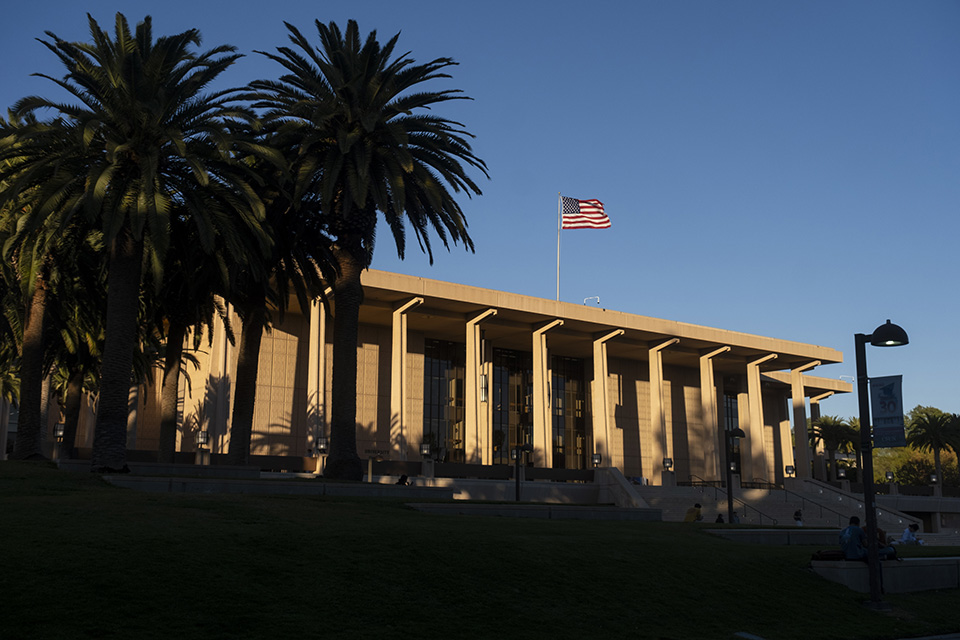CSUN Receives $3 Million Grant to Increase Number of Underserved Students in STEM, Arts Disciplines & Close Equity Gap

CSUN has received a five-year, $3 million federal grant for the creation of a new project to increase the number of underrepresented students studying science, technology, engineering, mathematics (STEM) and the arts, and health sciences and to close equity gaps. Photo by Ringo Chiu.
California State University, Northridge has been awarded a five-year, $3 million Title V grant from the U.S. Department of Education DHSI (Developing Hispanic Serving Institutions) program for the creation of a new project to increase the number of underrepresented students studying science, technology, engineering, mathematics (STEM) and the arts, and health sciences and to close equity gaps.
The money will support cross-divisional and multi-disciplinary “Strengthening Equitable Culturally Responsive Environments (SECURE) for Student Success (SfS2),” a collaborative effort between CSUN, Los Angeles Pierce College in Woodland Hills and College of the Canyons in Santa Clarita.
“Our goals are quite simple, but impactful,” said CSUN electrical and computer engineering professor S.K. Ramesh, director of SfS2. “We hope to increase enrollment, improve academic performance — including retention and graduation rates — and reduce equity gaps. To that end, the project will expand and enhance curriculum, research fellowships and culturally-responsive, work-based learning experiences in in-demand industry sectors for our students.
“For the project to be successful, and this is key, we are providing support and increasing faculty capacity to plan and implement culturally-responsive pedagogies, proactive advisement and mentoring,” Ramesh continued. “To put it simply, our students cannot succeed to the best of their abilities unless we give the faculty the tools they need to help our students succeed.
“This is an exciting new approach that we hope will serve as a model, not just for the rest of the CSU, but for institutions of higher learning across the country,” he said.
SfS2 is patterned after CSUN’s acclaimed AIMS2 (Attract, Inspire, Mentor and Support Students) program in the College of Engineering and Computer Science, also the brainchild of Ramesh, which launched 2011 with a grant from the U.S. Department of Education. AIMS2 students work in cohorts and have access to a wide range of academic resources such as faculty and peer mentors, tutors, educational field trips, workshops, career opportunities and travel grants to participate in conference.
With a student retention rate of more than 90 percent, and a three-year transfer graduation rate of more than 70 percent, AIMS2 was hailed by Excelencia in Education as a national example of an evidence-base program that advanced Latino student in higher education.
Ramesh said he expects SfS2 — which, in addition to STEM majors will include students studying the health sciences and the arts— to have similar success.
“We anticipate that the project will positively impact approximately 6,000 students at CSUN and our partner community colleges over the five-year duration of the grant at an average cost of less than $500 per student,” he said.
He said he hopes the programs and services envisioned through the project will be institutionalized across the CSUN campus “with measurable and accountable goals and aligning resources to ensure long-term collective success.”
Ramesh said SfS2 will be “all encompassing” when it comes to students. The project includes support for community college students before and after they transfer to CSUN; summer workshops; internships, industry engagement and career advisement; research opportunities with stipends; faculty and industry mentors; peer mentors; and undergraduate research symposiums, as well as ways to involve family members.
For participating faculty, the project includes curriculum enhancement and development support, workshops on multi-cultural competency and other forms of professional development.
SfS2 is closely aligned and complements CSUN’s Road Ahead Strategic plan under the able leadership of President Beck and colleagues campuswide. “. “If we want our students to truly succeed, then we take and explore different approaches to education — different approaches to how we teach and a deeper appreciation for how our students learn.”

 experience
experience